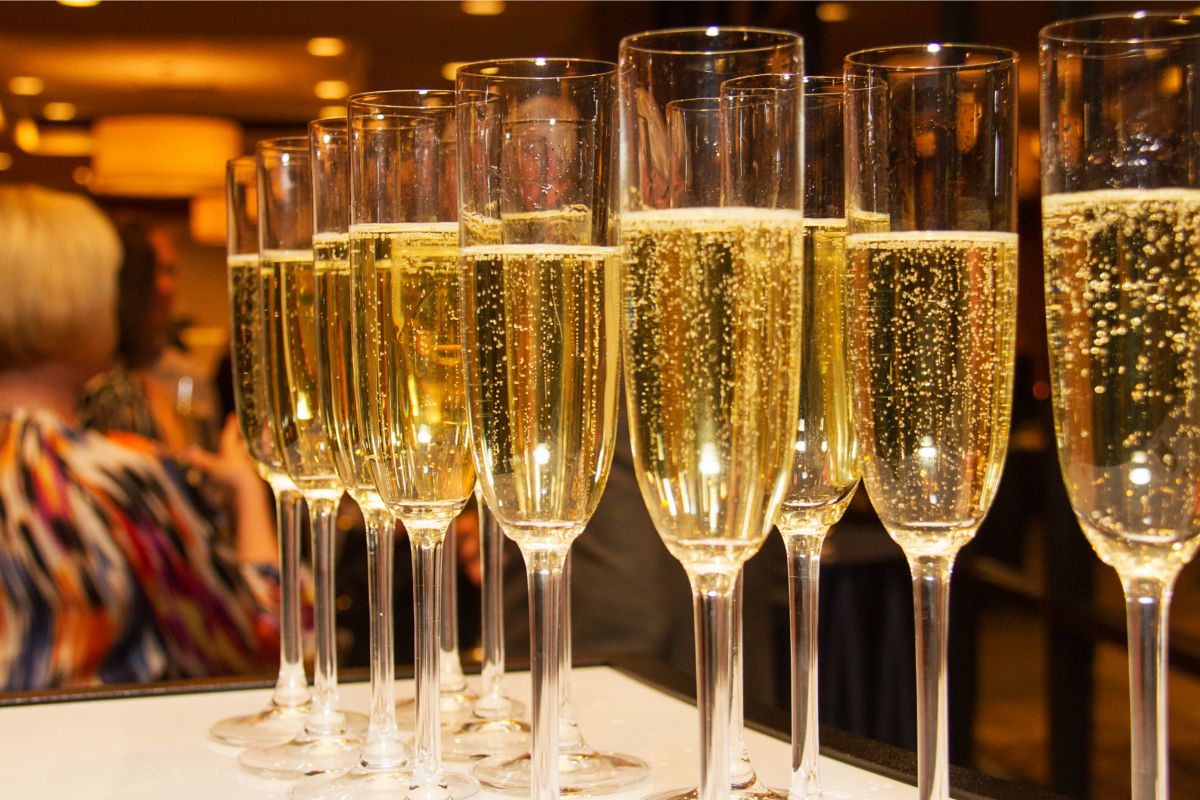Champagne is often associated with special occasions, and is generally used to celebrate something truly important.
But if you’ve never tasted champagne before, it can be hard to see just why exactly this sparkling white wine is reserved for special occasions.
Why not drink it throughout the year if it’s truly that nice? And how can you justify paying such high prices for certain bottles of champagne?

Today, we’re going to cover everything you need to know about the taste of champagne.
So even if you’ve never tasted champagne before, you will have a much better idea at the end of this article as to what you can expect when you try it for the first time.
So let’s take a look at what champagne tastes like so that you can get a better idea of what to expect from your first glass!
What Does Champagne Taste Like?
When Dom Perignon first created his champagne back in 1693, he supposedly said to his fellow monks, “Come quickly, I am tasting the stars!” And what better way to describe the taste of champagne?
Unlike a still wine, those carbonated bubbles help to give your glass of champagne an added bonus that truly sets it apart from other sparkling wines.
Trying to describe what champagne tastes like can be really tricky, as each bottle will vary depending on several factors.
There are 3 types of grapes that are used to make champagne, and the flavor of the bottle will differ depending on which grapes have been used.
Other factors such as whether it is a vintage or non-vintage champagne will also affect the taste, as non-vintage champagnes make use of grapes harvested from different vintages.
Overall, champagne tends to have typically fruity flavors such as apple, citrus, pear, and strawberry. Other notes that tend to feature on the palate are vanilla, cream, nutty flavors, and yeast.
Is Champagne Sweet Or Sour?
It ultimately depends on the sweetness classification of the bottle of champagne that you have.
An extra dry vintage will be much sweeter than a brut vintage, but there are several different ones to choose from when it comes to the sweetness scale.
The sweetest champagne is a demi sec, the next sweetest is a dry, then extra dry, then a brut, then an extra brut, and finally the least sweetest of the champagne vintages is the brut nature or zero dosage.
As far as wines go, champagne tends to be one of the least sweetest. One of the sweetest sparkling wines you can get is prosecco, which tends to be much sweeter than champagne.
Cava on the other hand is slightly on the drier side compared to champagne. Champagne is a good middle ground between these other types of sparkling wine.
But you can easily opt for the best champagne for your taste depending on whether you would prefer a brut vintage or an extra dry vintage.
Why Is Champagne So Expensive?
If you’ve never tried champagne before, it can be hard to see what all the fuss is about. Why is champagne so expensive?
Well it all comes down to the fact that you can only call a bottle of sparkling wine champagne if it has been grown and produced in the Champagne region of France. Anything else produced outside of this region isn’t true champagne.
So even though all champagne is sparkling wine, not all sparkling wine is champagne. Other types of sparkling wine include cava (Spain’s offering) and prosecco (Italy’s offering).
The champagne market is also very well established, so it would be difficult for a new company to set up its own vineyard in the Champagne region.
Champagne is a protected term, and because of the fact that only vintages grown and produced in this region can call themselves champagne, this naturally makes it a pricey bottle of sparkling wine.
It will also depend on other factors such as which grapes have been used to produce the champagne. If you have purchased a bottle of vintage champagne, this will be more expensive than a bottle of non-vintage champagne.
This is because a vintage bottle only makes use of grapes that were harvested from the same year.
Is Champagne Stronger Than Beer?
Depending on the beverage you are comparing it to, champagne is actually much stronger than beer.
The vast majority of beer bottles tend to have an alcohol content of around 3%, whereas a bottle of champagne has an alcohol content of 12%.
There are some beer bottles that have a much higher alcohol content, but as a general rule of thumb, champagne tends to be stronger.
It’s also a much more appropriate beverage for special occasions.
Beer is something that you can have at any time of the year, whereas champagne tends to be more of a special beverage that you can use to celebrate a significant event in your life.
As a result, champagne is typically seen as a more sophisticated drink.
In Summary
So there you have it! You should now have a much better idea of what a bottle of champagne will taste like. Remember that it will vary from bottle to bottle, vintage to vintage, and vineyard to vineyard.
There are lots of different factors that can influence what exactly your glass of champagne tastes like.
The general flavor profile of a glass of champagne will be several fruity notes of apple, citrus, pear, and strawberry. Vanilla, cream, yeast, and nutty notes can also feature depending on the champagne.
You can also alter the sweetness of your champagne depending on the vintage that you opt for.
The scale ranges from brut nature all the way up to demi sec, with brut nature being the least sweet out of all the champagne vintages.
Champagne is a truly special drink that will be suitable for toasting to the very best occasions in your life. So why not treat yourself to a bottle of champagne for your next birthday and have it chilling on ice ready to go?
You certainly won’t regret tasting the stars in your very first sip!

